'They shall grow not old, as we that are left grow old; age shall not weary them, nor the years condemn. At the going down of the sun and in the morning we will remember them.”
These poignant words from the fourth stanza from the poem ‘For the Fallen' written by Robert Binyon are being spoken out across Anzac Day services today throughout the Bay of Plenty, starting at dawn and moving throughout the day.
Thousands gathered before dawn at the Mount Maunganui cenotaph on Marine Parade opposite Mount Drury Reserve/Hopukiore. People began assembling before 5.45am, with a 5.55am march off followed by a service from 6am.
Planes flew past overhead as the dawn service drew to a close.
A Mount Maunganui Civic Memorial Service begins at 9.30am at the Mount Maunganui Cenotaph, wiht a march off starting at 9.25am.
.jpg)
Dawn service at the Mount Maunganui Cenotaph. Photo: John Borren.
.jpg)
Dawn service at the Mount Maunganui Cenotaph. Photo: John Borren.
.jpg)
Dawn service at the Mount Maunganui Cenotaph. Photo: John Borren.
.jpg)
Dawn service at the Mount Maunganui Cenotaph. Photo: John Borren.
.jpg)
Dawn service at the Mount Maunganui Cenotaph. Photo: John Borren.
.jpg)
Dawn service at the Mount Maunganui Cenotaph. Photo: John Borren.
.jpg)
Dawn service at the Mount Maunganui Cenotaph. Photo: John Borren.
.jpg)
Dawn service at the Mount Maunganui Cenotaph. Photo: John Borren.
.jpg)
Dawn service at the Mount Maunganui Cenotaph. Photo: John Borren.
.jpg)
Dawn service at the Mount Maunganui Cenotaph. Photo: John Borren.
.jpg)
Dawn service at the Mount Maunganui Cenotaph. Photo: John Borren.
Katikati
Katikati's dawn service began at 6am at the Katikati War Memorial Hall. Those who joined in the march assembled first at the Talisman Hotel by 5.45am.
Katikati will also have a short service at the Katikati Cemetery at 9am.
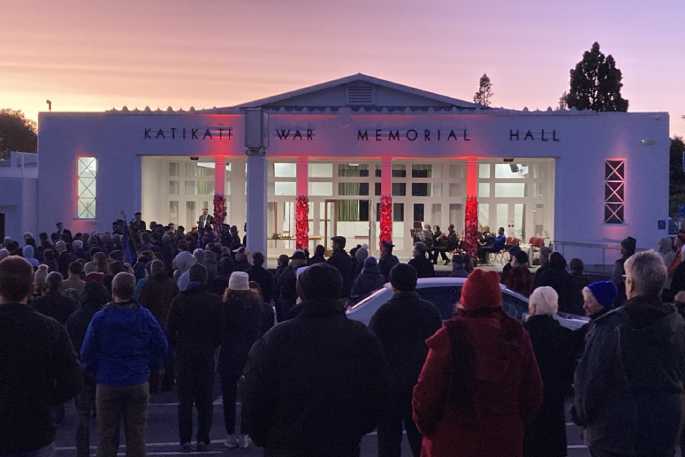
Dawn service at the Katikati War Memorial Hall, Katikati. Photo: Merle Foster.
.jpg)
Dawn service at the Katikati War Memorial Hall, Katikati. Photo: Merle Foster.
.jpg)
A poppy display on the pillars of the Katikati War Memorial Hall, Katikati. Photo: Merle Foster.
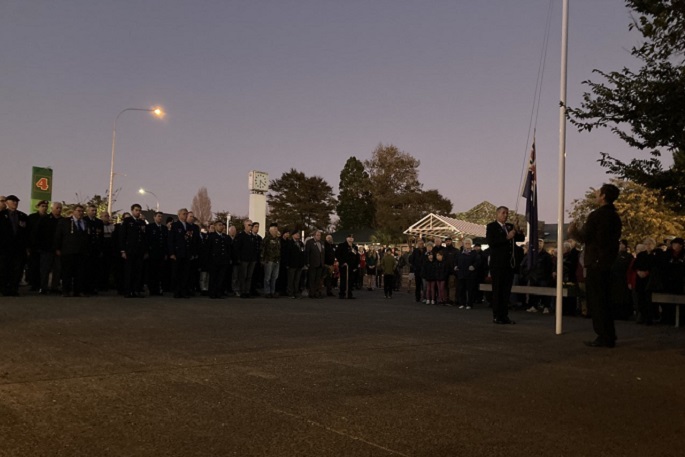
The crowd, standing silent while The Last Post is played at the flag pole outside the Katikati War Memorial Hall. Photo: Merle Foster.
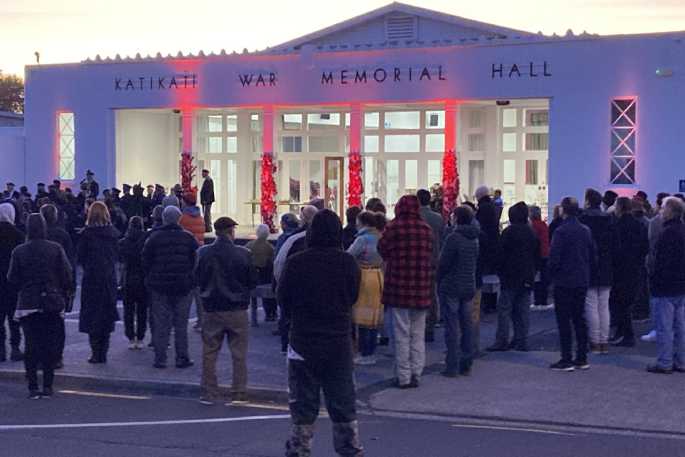
Dawn service at the Katikati War Memorial Hall, Katikati. Photo: Merle Foster.
The Tauranga Civic Memorial Service is at Tauranga Memorial Park, Eleventh Ave. Parade assembly is on the grass beside Queen Elizabeth Youth Centre at 8.45am. March off is 8.55am and the 9am service will take place indoors at Queen Elizabeth Youth Centre if poor weather prevents an outside gathering at Memorial Park. A park and ride and wreath laying are available at this service.
Pyes Pa will hold a Remembrance Service at 11am at Pyes Pa Cemetery, 403 Pyes Pa Rd.
Te Puke will have a parade begin 9.50am opposite Te Puke War Memorial Hall followed by a Civic Memorial Service from 10am at the Te Puke War Memorial Hall. Attendees are asked to be seated before arrival of the parade. After the service, people can move to the cenotaph for wreath laying.
The following road closures will be in place today:
In Tauranga city centre the following road closures will be in place from 7am - 12noon:
- Eleventh Avenue: between Devonport Road and Thirteenth Avenue
- Fraser Street: between Eleventh Avenue and Thirteenth Avenue
Mobility card holders will be able to get through the road closures.
At Mount Maunganui the following road closures will be in place from 2am to 12noon:
- Marine Parade: between Commons and Banks Avenues
- Pacific Avenue: between Rita Street and Marine Parade
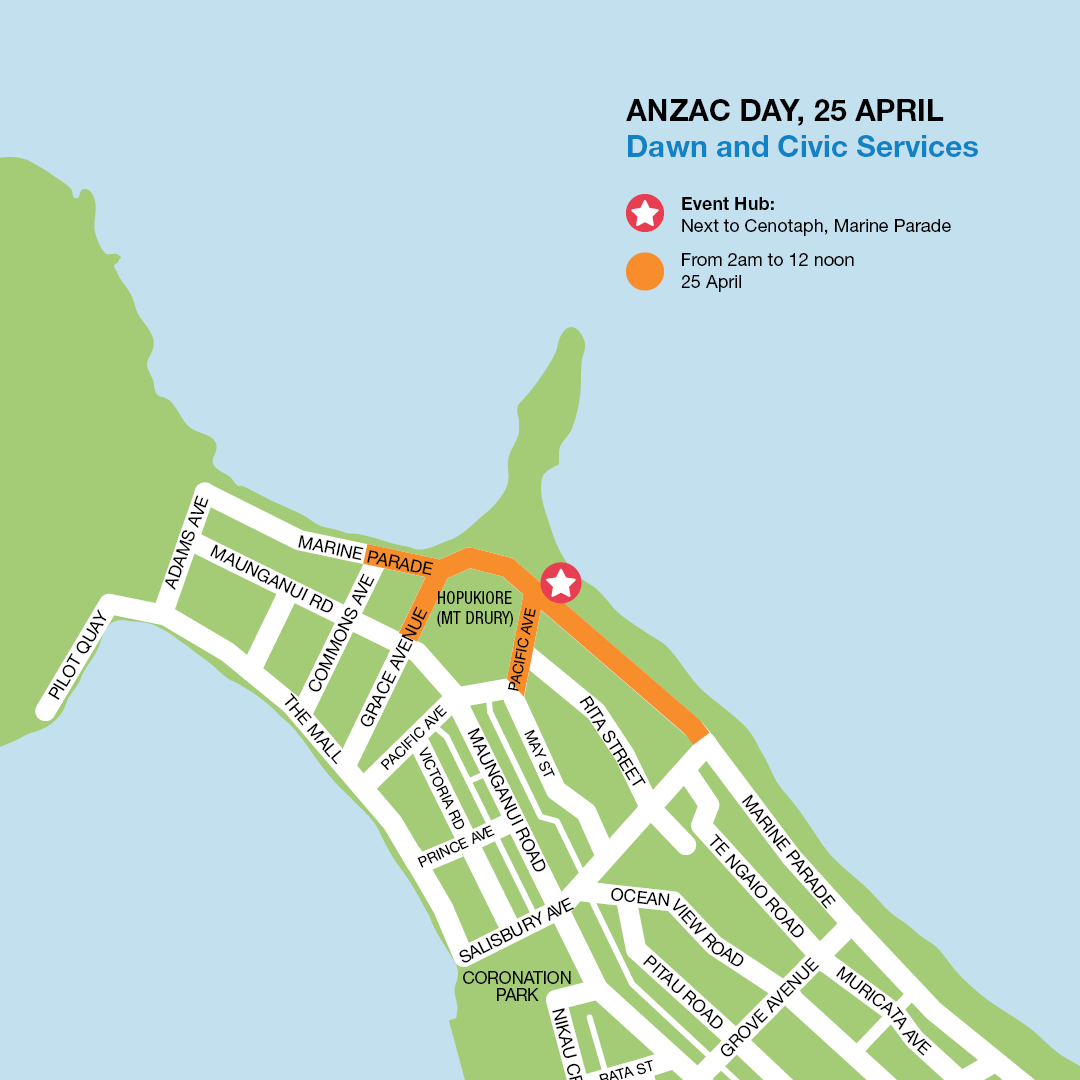
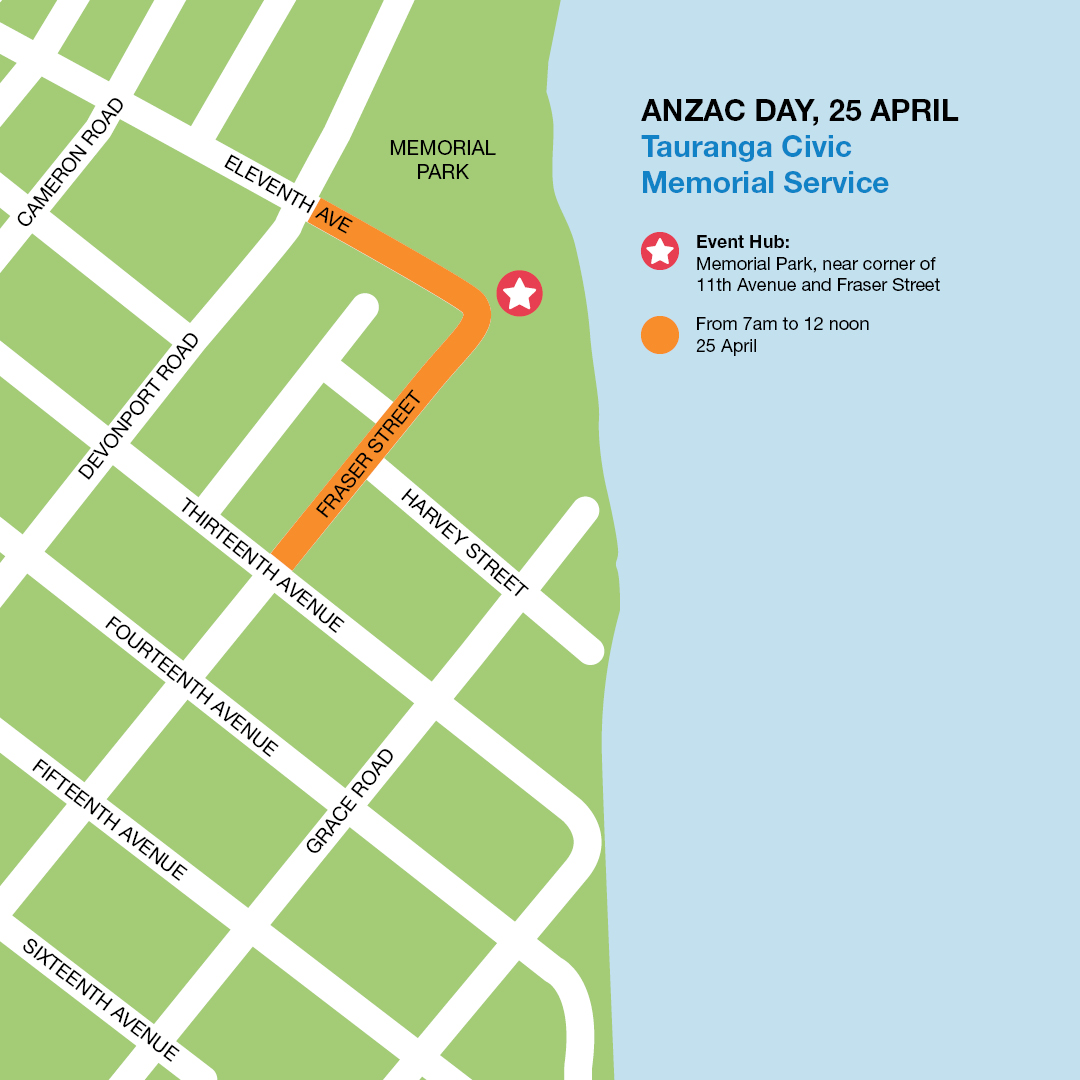
To find out more about ANZAC Commemorations on April 25 in the Tauranga region, see: https://www.tauranga.govt.nz/exploring/whats-on/annual-council-run-events/anzac-day/service-information
For contacts and information about ANZAC Day events in the Western BOP, see: https://www.westernbay.govt.nz/council/news-and-updates
Please send your Anzac Day dawn or remembrance service photos to [email protected]
‘For the Fallen'
Poem by Robert Laurence Binyon (1869-1943), published in The Times newspaper on 21 September 1914.
With proud thanksgiving, a mother for her children,
England mourns for her dead across the sea.
Flesh of her flesh they were, spirit of her spirit,
Fallen in the cause of the free.
Solemn the drums thrill: Death august and royal
Sings sorrow up into immortal spheres.
There is music in the midst of desolation
And a glory that shines upon our tears.
They went with songs to the battle, they were young,
Straight of limb, true of eye, steady and aglow.
They were staunch to the end against odds uncounted,
They fell with their faces to the foe.
They shall grow not old, as we that are left grow old:
Age shall not weary them, nor the years condemn.
At the going down of the sun and in the morning
We will remember them.
They mingle not with their laughing comrades again;
They sit no more at familiar tables of home;
They have no lot in our labour of the day-time;
They sleep beyond England's foam.
But where our desires are and our hopes profound,
Felt as a well-spring that is hidden from sight,
To the innermost heart of their own land they are known
As the stars are known to the Night;
As the stars that shall be bright when we are dust,
Moving in marches upon the heavenly plain,
As the stars that are starry in the time of our darkness,
To the end, to the end, they remain.
Laurence Binyon composed his best known poem while sitting on the cliff-top looking out to sea from the dramatic scenery of the north Cornish coastline. A plaque marks the location at Pentire Point, north of Polzeath. However, there is also a small plaque on the East Cliff north of Portreath, further south on the same north Cornwall coast, which also claims to be the place where the poem was written.
The poem was written in mid September 1914, a few weeks after the outbreak of the First World War. During these weeks the British Expeditionary Force had suffered casualties following its first encounter with the Imperial German Army at the Battle of Mons on August 23, its rearguard action during the retreat from Mons in late August and the Battle of Le Cateau on August 26, and its participation with the French Army in holding up the Imperial German Army at the First Battle of the Marne between September 5 and 9, 1914.
Laurence said in 1939 that the four lines of the fourth stanza came to him first. These words of the fourth stanza have become especially familiar and famous, having been adopted by the Royal British Legion as an Exhortation for ceremonies of Remembrance to commemorate fallen Servicemen and women.
Laurence Binyon was too old to enlist in the military forces but he went to work for the Red Cross as a medical orderly in 1916. He lost several close friends and his brother-in-law in the war.

.jpg)

2 comments
In our Psyche.
Posted on 25-04-2023 15:19 | By morepork
It is beautiful to see that we do remember the men and women who died to guarantee us freedom and the right to elect our Government. Anzac Day is part of our culture and deeply ingrained in all of us. Whatever our backgrounds or ethnicities, the sacrifice that was made, can be understood by all of us, and we should (and do) cherish it. Even as young Ukrainian men are dying to defend the same principles, young Russian men being fed to the grinder for the ambition of a tyrant, we find inspiration in those who kept alight the torch of freedom and made the ultimate sacrifice. The tragedy is that in some places, nothing is learned and war continues. As a last resort, to stop oppression, we have to use violence. The better way is to sit round a table and seek solutions. Can we ever learn?
Thanks SunLive.
Posted on 25-04-2023 15:24 | By morepork
A moving report with beautiful photographs. Even if we never get to a point where War is recognized as an obsolete form of negotiation, I hope we will continue to implement Binyen's heartfelt thoughts, and remember them on April 25th.
Leave a Comment
You must be logged in to make a comment.